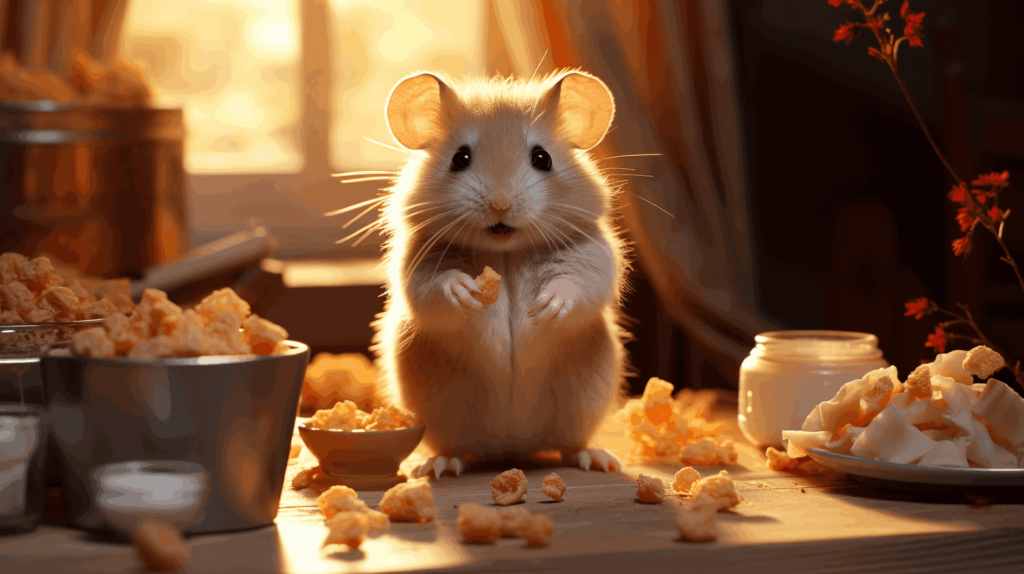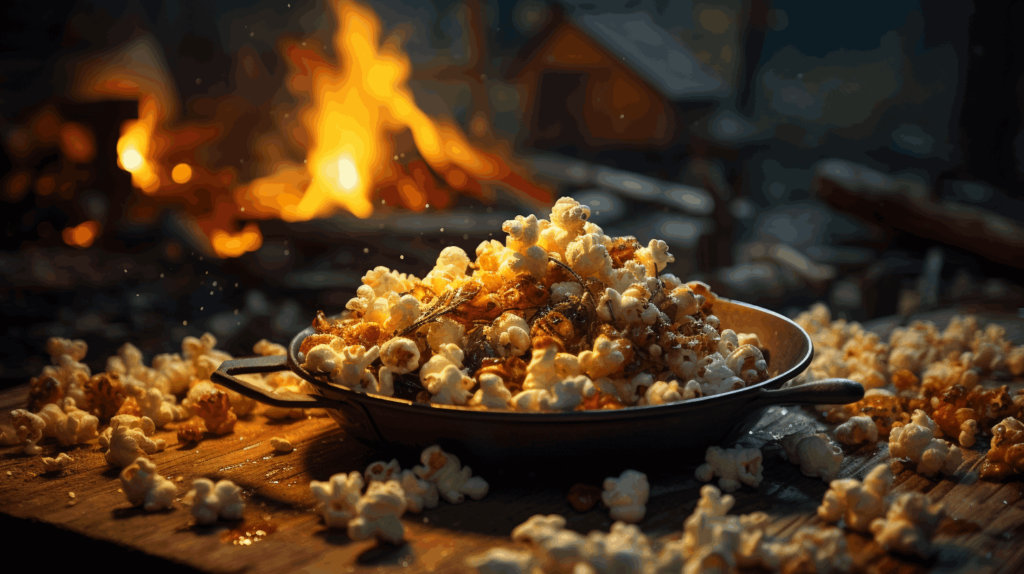Did you know that popcorn is a popular snack among humans?
But when it comes to deer, a creature known for its herbivorous tendencies, the question arises: can deer eat popcorn?
In this article, we will explore the nutritional implications of feeding popcorn to deer and shed light on the potential risks and consequences.
Drawing upon expert opinions and scientific research, we aim to provide a comprehensive understanding of why popcorn is not an ideal choice for deer, prioritizing the well-being of these majestic animals.
Key Takeaways
- Popcorn is not a suitable food choice for deer as it lacks the necessary nutrients for survival.
- Feeding popcorn to deer can lead to digestive issues, discomfort, malnutrition, and even death.
- Deer bodies are not designed to digest carbohydrates like popcorn, which can cause long-term adverse effects on their health.
- Instead of popcorn, it is best to provide deer with natural vegetation and other safe food options like acorns, fruits, and vegetables.
The Risks of Feeding Popcorn to Deer
While popcorn may not be toxic to deer, feeding it to them can lead to sickness and even death due to the digestive issues it can cause. Deer’s bodies are not built to digest carbohydrates like popcorn, which lacks the nutrients they need to survive.
Popcorn is made entirely of carbohydrates, filling a deer’s stomach without providing any nutrition. Consuming foods with low nutritional value can have catastrophic consequences for deer, as they rely on nutrient-dense foods to build fat reserves for the winter.
Feeding popcorn kernels to deer can result in discomfort, malnutrition, and long-term adverse effects on their health. Introducing deer to their natural vegetation, acorns, fruits, and vegetables, which are easily digestible and nutrient-rich, rather than feeding them popcorn, is advisable.
Why Popcorn Is a Poor Nutritional Choice for Deer
Popcorn, lacking essential nutrients and consisting solely of carbohydrates, is an ill-advised and unsuitable nutritional choice for deer. While deer are opportunistic feeders and may consume popcorn if they are hungry, it does not provide any nutritional value for them.
Deer have delicate digestive systems that are not designed to digest carbohydrates like popcorn effectively. Moreover, popcorn lacks the necessary nutrients deer need to survive and thrive. Consuming popcorn can fill a deer’s stomach without providing any natural nutrition, resulting in malnutrition and health issues.
Understanding that deer’s bodies are adapted to a natural diet of easily digestible and nutrient-rich vegetation is crucial. Feeding deer their natural winter diet, including plants, acorns, fruits, and vegetables, is a better option to support their health and well-being than offering them popcorn.
The Digestive Issues Associated With Popcorn Consumption
The digestive issues associated with popcorn consumption can lead to discomfort and malnutrition in deer. The delicate digestive system of deer is not designed to process carbohydrates like popcorn. When deer consume popcorn, it fills their stomachs without providing nutritional value. This can result in malnutrition, as the deer’s body lacks the nutrients necessary to survive.
Furthermore, popcorn kernels cannot be digested by deer and can cause discomfort and digestive upset. Feeding popcorn to deer can have long-term adverse effects on their health, potentially leading to sickness or even death. It is crucial to understand that deer require nutrient-dense foods, such as their natural vegetation, acorns, fruits, and vegetables, to maintain their health and build fat reserves for the winter.
Therefore, it is not advisable to feed popcorn to deer.
Corn as an Unsuitable Food Option for Deer
With its low nutritional value and potential for digestive upset, corn is an unsuitable food option for deer. Although corn may be a popular choice for feeding wildlife, it lacks the necessary nutrients that deer require for optimal health.
Corn primarily comprises carbohydrates, filling a deer’s stomach without providing much-needed nutrition. Deer rely on nutrient-dense foods to build fat reserves for the winter, and corn does not provide enough of these essential nutrients.
Furthermore, corn can cause digestive upset in deer and may lead to malnutrition and discomfort. Instead of feeding deer corn, it is recommended to provide them with natural vegetation, such as acorns, fruits, and vegetables, which are easily digestible and nutrient-rich.
Alternative Food Options for Deer
In light of the previous discussion on corn’s unsuitability for deer, let us explore alternative food options for deer that can provide them with the necessary nutrients for optimal health.
- Natural Vegetation: Deer naturally eats a variety of plants that are easily digestible and nutrient-rich. Feeding deer their natural vegetation is the best option.
- Acorns: Acorns are a safe food option for deer and provide them with essential nutrients.
- Fruits: Providing deer with fruits can be a great way to supplement their diet and offer them a variety of flavors and nutrients.
- Vegetables: Certain vegetables like carrots and sweet potatoes can be a good source of nutrition for deer.
The Impact of Popcorn on Deer’s Health
Popcorn’s contribution to the deterioration of deer’s health is a cause for concern among wildlife experts. While popcorn may seem harmless for humans, it poses significant risks to deer. Popcorn lacks the nutrients that deer need to survive and can cause digestive issues.
Deer bodies are not built to digest carbohydrates like popcorn, which is made entirely of carbohydrates and provides no nutritional value. Consuming foods with low nutritional value can have catastrophic consequences for deer, leading to sickness and even death. Feeding popcorn to deer is not advisable as the kernels cannot be digested and can cause discomfort and malnutrition.
Instead, deer should be provided with natural vegetation, such as acorns, fruits, and vegetables, which are easily digestible and nutrient-rich. It is crucial to prioritize the health and well-being of deer by avoiding the feeding of popcorn and other unsuitable foods.
The Importance of Feeding Deer Their Natural Vegetation
Feeding deer their natural vegetation is essential for their overall health and well-being, providing the necessary nutrients and easily digestible food they need to thrive. When considering what to feed deer, it is essential to prioritize their natural diet over alternative options such as popcorn.
Here are four key reasons why feeding deer their natural vegetation is crucial:
- Nutritional Value: Natural vegetation offers a wide range of vital nutrients for deer’s growth and development. It provides them with the essential vitamins, minerals, and proteins they need to maintain a healthy immune system and strong bones.
- Digestive Health: Deer’s digestive systems are specifically designed to process their natural vegetation. Deviating from their natural diet, like feeding them popcorn, can lead to digestive issues and discomfort for the deer.
- Weight Management: Natural vegetation allows deer to control their weight and build fat reserves, which is crucial for surviving harsh winter conditions. Popcorn and other low-nutrient options do not provide the necessary sustenance for deer to store enough fat reserves.
- Behavioral Normalization: Feeding deer their natural vegetation helps maintain their natural foraging behavior. It encourages them to seek out and consume the essential plant species for survival, promoting a balanced ecosystem.
Debunking the Myth: Can Deer Survive on Popcorn?
Two commonly held beliefs about deer and popcorn are debunked in this discussion.
Firstly, popcorn is not a suitable nutritional choice for deer. It lacks the necessary nutrients that deer need to survive and is primarily made up of carbohydrates, providing empty calories. Consuming popcorn can lead to digestive issues and even death for deer.
Secondly, corn, in any form, is also not a recommended food for deer. It has little nutritional value and can cause digestive upset. Deer rely on nutrient-dense foods to store fat reserves for the winter, and corn products do not provide enough nutrients for this purpose.
Instead, feeding deer their natural vegetation, such as acorns, fruits, and vegetables, is best to ensure their health and well-being.
Conclusion
In conclusion, it is abundantly clear that popcorn is a perilous choice for deer. The risks associated with feeding them this unsuitable snack are undeniable. From digestive issues to the lack of nutritional value, popcorn severely threatens these majestic creatures’ health and well-being.
We must prioritize their natural vegetation and avoid perpetuating the myth that deer can survive on popcorn. Let us not gamble with their lives and instead make informed decisions that benefit their survival.


